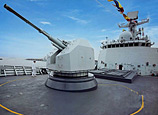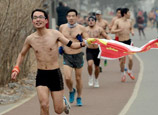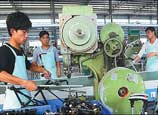
KFC China, a division of Yum Brands Inc, announced new quality-assurance measures on Monday in a bid to restore brand confidence.
The moves include eliminating more than 1,000 unqualified chicken houses; improving control on poultry suppliers; and implementing timely reporting and communicating with the public, the company said.
Last year, Shanghai's food regulators said that tests conducted by a third-party agency found that eight batches of chicken supplied to KFC by Liuhe Group Co had excessive levels of antibiotics. The fast-food chain said it stopped all supplies from Liuhe in 2012.
"Some of these smaller and not-as-well-managed chicken-house operators may resort to improper use of antibiotics or other drugs, especially if illness (in chickens) occurs," said Sam Su, chairman and CEO of Yum China.
Su denied reports that hormones were used in its chicken farms, and emphasized that the Liuhe antibiotics scandal was an isolated incident.
Guo Geping, president of the China Chain Store and Franchise Association, said Yum still has its work cut out.
"Although many foreign enterprises, including Yum, have made much greater efforts in quality assurance here in China than in their home countries, food safety is still their biggest task," he said.
As a result of the antibiotics case, KFC sales in China, its largest overseas market, have been adversely affected.
The Louisville, Kentucky-based fast-food giant reported that net profit dipped 6 percent to $337 million in the fourth quarter. Its same-store sales in China declined 6 percent in the quarter, compared to a 3 percent increase in the United States.
McDonald's Corp, Yum's largest rival in China, said the chicken scare had taken a small bite out of its business as well, as sales at its established China restaurants fell 0.9 percent in the fourth quarter.
Industry experts said the chicken fears not only affected sales of quick-service brands, but the industry as a whole.
"China is the world's second-largest chicken producer, with 7.7 million tons a year, and Chinese per capita chicken consumption is 9.05 kilograms a year. So decreasing consumer confidence might have a greater effect on the whole industry chain," said Gong Guifen, deputy secretary-general of China Animal Agriculture Association.
David Novak, chairman and chief executive of Yum, said earlier this month that despite the setback, the company will still accelerate its development plans in China, and will open hundreds more outlets this year.
KFC's first branch opened in China in 1987. Today it has more than 4,000 restaurants.
Ma Wenfeng, a food industry analyst with Cnagri.com, said the chicken scandal hit Yum harder than expected.
"As Yum's most important global market, the company will feel the effect of sluggish sales revenue in China for a while," Ma said.
















 Have you been absent during your children's childhood?
Have you been absent during your children's childhood?


![]()
